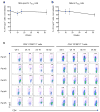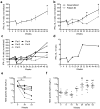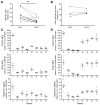Changes in antigen-specific T-cell number and function during oral desensitization in cow's milk allergy enabled with omalizumab
- PMID: 22318492
- PMCID: PMC3328586
- DOI: 10.1038/mi.2012.5
Changes in antigen-specific T-cell number and function during oral desensitization in cow's milk allergy enabled with omalizumab
Abstract
Food allergy is a major public health problem, for which there is no effective treatment. We examined the immunological changes that occurred in a group of children with significant cow's milk allergy undergoing a novel and rapid high-dose oral desensitization protocol enabled by treatment with omalizumab (anti-immunoglobulin (Ig)E monoclonal antibodies). Within a week of treatment, the CD4(+) T-cell response to milk was nearly eliminated, suggesting anergy in, or deletion of, milk-specific CD4(+) T cells. Over the following 3 months while the subjects remained on high doses of daily oral milk, the CD4(+) T-cell response returned, characterized by a shift from interleukin-4 to interferon-γ production. Desensitization was also associated with reduction in milk-specific IgE and a 15-fold increase in milk-specific IgG4. These studies suggest that high-dose oral allergen desensitization may be associated with deletion of allergen-specific T cells, without the apparent development of allergen-specific Foxp3(+) regulatory T cells.
Trial registration: ClinicalTrials.gov NCT00968110.
Conflict of interest statement
Figures






References
-
- Noon L. Prophylactic inoculation for hay fever. Lancet. 1911;1:1572.
-
- Larche M, Akdis CA, Valenta R. Immunological mechanisms of allergen-specific immunotherapy. Nat Rev Immunol. 2006;6:761–71. - PubMed
-
- Jutel M, Akdis CA. Immunological mechanisms of allergen-specific immunotherapy. Allergy. 2011 in press. - PubMed
Publication types
MeSH terms
Substances
Associated data
Grants and funding
LinkOut - more resources
Full Text Sources
Other Literature Sources
Medical
Research Materials

